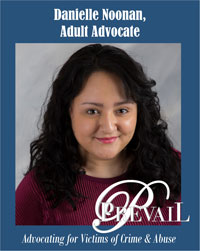By DANIELLE NOONAN
Adult Advocate, Prevail Inc.
 Take a mental road trip with me, readers. I want you to imagine what places like Prevail are working toward and why we do what we do. Our destination is a future without violence, a future without preventable, power-based trauma. What does that future look like to you? Who is there, and who helped us get there? If we are doing anti-violence work toward this future, then what are we for?
Take a mental road trip with me, readers. I want you to imagine what places like Prevail are working toward and why we do what we do. Our destination is a future without violence, a future without preventable, power-based trauma. What does that future look like to you? Who is there, and who helped us get there? If we are doing anti-violence work toward this future, then what are we for?
At Prevail, we know that power and control are the catalysts of violence. When control is unjust, it’s called oppression. In our work, we have a long legacy and well-documented history with oppression as a root cause of violence and the systems that allow it to continue.
More recently, our organization has not only been asking What are we for? but also asking some accountability questions, because we know we have a role to play in working toward this future. Questions like: Is Prevail a system that allows this to continue? If not, how are we serving the most marginalized and most vulnerable people in our community? How can we continue to create safe, healing, and supportive spaces for all?
We need Prevail to be accessible to all survivors. All survivors.
Whether you’re 6 or 60, our role is to stop ageism from limiting your access to services. If you are multilingual or speak ASL, our role is to provide language advocacy to make our services accessible. We serve all genders and all sexual orientations, because we know that violence impacts these communities without discrimination. Our services are free and confidential, because poverty and privacy can be barriers.
In order to continue the work we have been doing, we are actively working on what our role is in the anti-racism and racial justice space in our community. Understanding and unpacking racism is important for us to do, because on this road to anti-violence we will cross many intersections with overlapping needs to meet.
When you hear “intersectionality” it may be helpful to think about a literal intersection. Let’s say we have a “survivor road” that offers a lane for the elderly community; we have another “road” that supports low-income persons. Intersectionality means that we acknowledge both of those barriers and see the survivor as a whole person, including their racial identity. It means that we see how the history of those identities can impact their belief systems and needs.
Intersectionality means that we know that identity does not fit in tidy checkboxes in the same way that we know that violence doesn’t either. Violence is not only physical, but can also be sexual, financial, psychological and spiritual. Identities and the ways in which others violate those identities through oppression is complex and layered. It requires bold reflection and courageous willingness to change.
Intersectionality is about how these social categories (such as race, class, gender, age, etc.) overlap with each other and can compound the barriers to healing.
We don’t have the answers and we haven’t figured out all the ways to respond to these intersections, but we are committed to working on it. Through racial justice initiatives, we are committed to better responding to our Black, Indigenous, and people of color (BIPOC) clients in the same ways we have been able to show up for other intersections. When we know better, we do better.
Racial justice is the proactive reinforcement of policies, practices, attitudes and actions that produce equitable power, access, opportunities, impacts, and outcomes for all. (Source: RET) This has always been our journey, and this is still our lane. Prevail plans to keep showing up and invites you to continue on this road with us.
Let us begin by not engaging in minimizing the experiences of survivors of color. Let us start by being for the acknowledgement, validation, and support of them, as folks strive to make sense of their experiences. Let us be safe places and safe people in the lives of those who are trying to move forward from their trauma and trying to join us in creating an anti-violence future. Let Prevail offer to you this: Racial trauma matters. Historical trauma is real. You matter, and you belong here too.
“All forms of violence and oppression are connected, and you cannot fight against one form of injustice and not fight against others. The calls for accountability must be heard from all corners of society, including from within the anti-violence movement. We cannot end violence without addressing the power disparities caused by racism and discrimination.” – Indiana Coalition Against Domestic Violence
